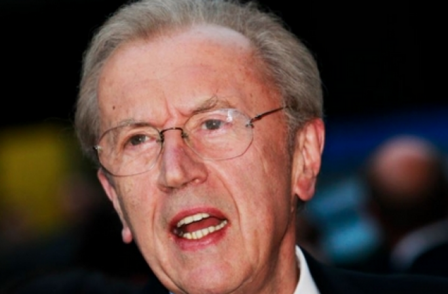
The Prince of Wales was among more than 2,000 people paying tribute to late broadcaster Sir David Frost at a service in Westminster Abbey.
They were being joined by famous faces from the worlds of politics and showbusiness including Sir Michael Parkinson, Lord Owen and Joanna Lumley.
Other royal guests invited to the memorial service included the Countess of Wessex, the Duke of York and his daughter Princess Beatrice.
Charles was joined by Sir David's widow, Lady Carina Fitzalan-Howard, to lay flowers on a memorial stone dedicated to the broadcaster who died last August aged 74.
Among those who spoke to honour him were the BBC's director-general Lord Hall and Sir Michael who both delivered readings.
Dean of Westminster the Very Rev Dr John Hall said Sir David was "amongst our greatest communicators".
He said: "Surely it was the warmth of his humanity, his interest in people, and what made them tick, that made his 'Hello, good evening and welcome' welcome in the world's living rooms."
Two of Sir David's sons were delivering poems during the service and hymns included He Who Would Valiant Be and Jerusalem.
Ronnie Corbett, who worked with Sir David in the 1960s satire boom that launched both their careers, was among those reading prayers during the service.
The service reflected the thread of humour and satire which ran through his career with a comic tribute from Lumley called A Sonnet Of Sorts For A Star, which she co-wrote with musician Sir Richard Stilgoe.
It began: "Shall I compare thee to Sir Robin Day? Thou wert more lovely and more temperate. Earth has not anything to show more fair, Hello, good evening, welcome, Frosty's there."
The humorous tribute included the lines: "No more TV-am, no Al Jazeera – We end not a career, but end an era; For now he's gone, ascended into orbit, And 'I look up to him' (quoth Ronnie Corbett)." It concluded with the line: "When Frost has gone, can spring be far behind?"
Known for his incisive interviews – above all, with disgraced US president Richard Nixon – Sir David spent more than 50 years as a television star.
His award-winning interview style was considered non-aggressive, affable and effusive – but he had a talent for extracting intriguing information and revealing reactions from his subjects.
During his series of five interviews with Nixon in 1977, the slippery former president known as "Tricky Dicky" dramatically admitted that he had "let down the country".
The encounter later formed the basis of the play Frost/Nixon, which was made into a hit film with Michael Sheen playing Sir David.
Email pged@pressgazette.co.uk to point out mistakes, provide story tips or send in a letter for publication on our "Letters Page" blog
